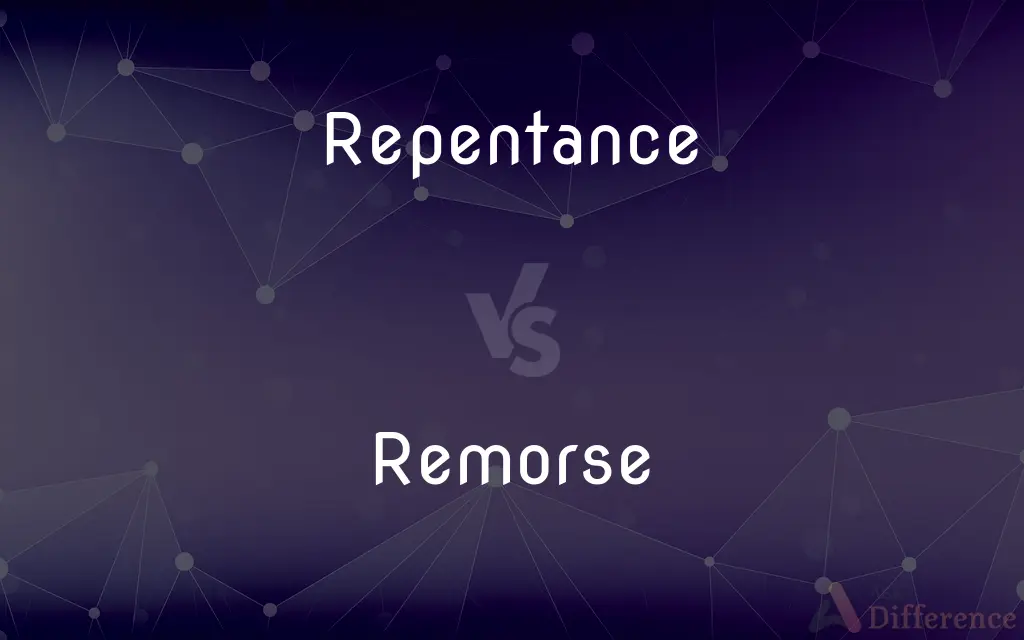Repentance vs. Remorse — What's the Difference?
Edited by Tayyaba Rehman — By Maham Liaqat — Updated on March 27, 2024
Repentance involves a deep, sincere commitment to change behavior due to moral or spiritual convictions, while remorse is feeling deep regret or guilt for a wrong committed.

Difference Between Repentance and Remorse
Table of Contents
ADVERTISEMENT
Key Differences
Repentance is recognized by its forward-looking nature, focusing on personal change and rectification of past wrongs. It's often associated with the desire for improvement and making amends. On the other hand, remorse concentrates on the emotional pain and guilt felt for past actions, without necessarily including the intent to change future behavior.
While repentance is deeply embedded in many religious traditions as a process of seeking forgiveness from a higher power and turning away from wrongdoing, remorse can be felt by anyone regardless of religious beliefs, as it stems from a sense of moral guilt or regret over actions that have hurt others.
Repentance usually requires acknowledgment of one's wrongs to oneself and often to others, as well as to God in religious contexts. This acknowledgment is seen as a first step towards change. Conversely, remorse might remain a private feeling, not necessarily shared with others or accompanied by any steps towards amendment.
The process of repentance often includes making amends where possible, as a way to demonstrate sincere change and repair the damage done. Remorse, while it may inspire apologies, doesn’t inherently involve taking action to rectify the consequences of one’s actions.
Repentance is considered a proactive and constructive approach to dealing with wrongdoing, as it aims at personal growth and reconciliation. Remorse, although it can be a catalyst for change, is primarily a reactive and emotional response to recognizing one’s faults.
ADVERTISEMENT
Comparison Chart
Definition
The action of repenting; sincere regret or remorse, coupled with a commitment to change for the better.
Deep regret or guilt for a wrong committed.
Focus
On changing future behavior and making amends.
On the emotional impact of past actions.
Associated with
Often involves a spiritual or religious process of seeking forgiveness.
Primarily a psychological response to recognizing harm caused.
Requires
Acknowledgment of wrongdoing, often to others, and a desire to take action.
May not lead to action or change.
Outcome
Aims at personal growth and reconciliation.
Often remains an internal feeling of guilt.
Compare with Definitions
Repentance
The feeling of sorrow for one's actions coupled with a resolution to change.
After realizing the harm he had caused, his repentance led him to volunteer in community service as a form of restitution.
Remorse
The emotional pain of recognizing the negative impact of one’s actions on others.
She felt a profound sense of remorse after seeing the consequences of her lies.
Repentance
An acknowledgment of personal wrongdoing and the hurt it has caused others.
Her public repentance was seen as a step towards healing the rift with her community.
Remorse
A state of being remorseful can be a private, personal experience of guilt.
In the solitude of his room, he experienced intense remorse for his actions.
Repentance
A religious or spiritual act of seeking forgiveness for sins and committing to sin no more.
In many religious traditions, repentance is a prerequisite for attaining divine forgiveness.
Remorse
An emotional response that may or may not be expressed publicly.
She carried a burden of remorse that she never shared with anyone.
Repentance
A commitment to personal growth and improvement following recognition of one’s mistakes.
True repentance was shown in his dedication to becoming a better person.
Remorse
A deep regret for one's wrongdoing or the hurt caused to others.
His remorse was evident in his tearful apology to the family.
Repentance
The process of turning away from behaviors that are considered immoral or harmful.
His journey of repentance involved leaving his previous life of crime and starting afresh.
Remorse
An internal feeling that does not necessarily lead to action or change.
Despite his remorse, he made no efforts to rectify the damage he had done.
Repentance
Repentance is the activity of reviewing one's actions and feeling contrition or regret for past wrongs, which is accompanied by commitment to and actual actions that show and prove a change for the better. In modern times, it is generally seen as involving a commitment to personal change and the resolve to live a more responsible and humane life.
Remorse
Moral anguish arising from repentance for past misdeeds; bitter regret.
Repentance
The action of repenting; sincere regret or remorse
Each person who turns to God in genuine repentance and faith will be saved
Remorse
The anguish, like gnawing pain, excited by a sense of guilt; compunction of conscience for a crime committed, or for the sins of one's past life.
Repentance
The act or process of repenting.
Remorse
Sympathetic sorrow; pity; compassion.
Curse on the unpardoning prince, whom tears can drawTo no remorse.
But evermore it seem'd an easier thingAt once without remorse to strike her dead.
Repentance
Remorse or contrition for past conduct or sin.
Remorse
Remorse is a distressing emotion experienced by an individual who regrets actions which they have done in the past that they deem to be shameful, hurtful, or wrong. Remorse is closely allied to guilt and self-directed resentment.
Repentance
The condition of being penitent.
Remorse
Deep regret or guilt for a wrong committed
They were filled with remorse and shame
Repentance
A feeling of regret or remorse for doing wrong or sinning.
Remorse
(Obsolete) Compassion.
Repentance
The act of repenting, or the state of being penitent; sorrow for what one has done or omitted to do; especially, contrition for sin.
Godly sorrow worketh repentance to salvation.
Repentance is a change of mind, or a conversion from sin to God.
Repentance is the relinquishment of any practice from the conviction that it has offended God. Sorrow, fear, and anxiety are properly not parts, but adjuncts, of repentance; yet they are too closely connected with it to be easily separated.
Remorse
A feeling of regret or sadness for doing wrong or sinning.
Repentance
Remorse for your past conduct
Remorse
(obsolete) Sorrow; pity; compassion.
Remorse
A feeling of deep regret (usually for some misdeed)
Common Curiosities
What is remorse?
Remorse is a deep feeling of regret or guilt for a wrong that one has committed.
How do repentance and remorse differ in terms of action?
Repentance involves a commitment to change behavior and make amends, whereas remorse may not lead to any action to rectify the wrong.
Can remorse lead to repentance?
Yes, feelings of remorse can be a catalyst for repentance when the individual decides to take steps to change their behavior and make amends.
What are the signs of true repentance?
Signs include acknowledging the wrongdoing, apologizing to those harmed, making amends, and showing consistent efforts to avoid repeating the wrong.
What is repentance?
Repentance is the act of feeling sorry for one's sins or wrongs and making a sincere effort to change and avoid repeating those actions.
Is repentance always religious?
While often associated with religious practices, repentance can also be a secular process of acknowledging wrongdoing and committing to personal growth.
How do religions typically view repentance?
Many religions view repentance as a crucial step towards forgiveness and redemption, often involving confession, prayer, or other rites.
Can remorse be considered a positive emotion?
While painful, remorse can be positive if it leads to self-awareness and personal growth, especially if it catalyzes a process of repentance.
Is it possible to repent without feeling remorse?
Genuine repentance typically involves remorse, as recognizing the harm caused is part of the motivation to change.
Why is remorse sometimes kept private?
Individuals may keep their feelings of remorse private due to shame, fear of judgment, or uncertainty about how to express their feelings.
Do you need to express remorse to feel repentance?
Expression of remorse can be part of repentance, but the key aspect of repentance is the commitment to change, not just the feeling of guilt.
Can someone feel remorse without being repentant?
Yes, it’s possible to feel remorse for one's actions without making a commitment to change or make amends.
Can repentance affect one's sense of self?
Yes, through the process of repentance and making amends, individuals can develop a stronger, more positive sense of self and moral integrity.
What role does forgiveness play in repentance and remorse?
Forgiveness from those harmed can be a powerful aspect of the healing process, encouraging further personal growth and reconciliation.
How does one show repentance?
By openly acknowledging the wrongdoing, apologizing, making amends where possible, and demonstrating a change in behavior.
Share Your Discovery

Previous Comparison
Zigbee vs. Bluetooth
Next Comparison
Sailing vs. VoyageAuthor Spotlight
Written by
Maham LiaqatEdited by
Tayyaba RehmanTayyaba Rehman is a distinguished writer, currently serving as a primary contributor to askdifference.com. As a researcher in semantics and etymology, Tayyaba's passion for the complexity of languages and their distinctions has found a perfect home on the platform. Tayyaba delves into the intricacies of language, distinguishing between commonly confused words and phrases, thereby providing clarity for readers worldwide.












































